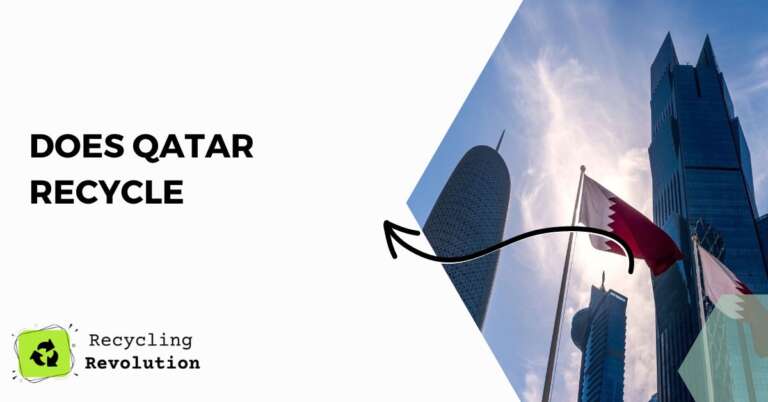Today, I’m drawing on extensive information to explore the question: “Does Qatar recycle?” The answer, while not simple, is a resounding Yes, Qatar does indeed have recycling initiatives, but the country’s approach and effectiveness are much more nuanced.
TL;DR: Qatar is making significant strides in the recycling domain, implementing various initiatives and schemes to manage waste effectively. However, the efforts are still budding and require extensive work to reach their full potential.
Qatar, like many growing nations, has been battling its waste generation issues. The country has recognized the importance of waste management and has been steadily working towards establishing more efficient recycling systems.
Government-Led Efforts
The government of Qatar has been instrumental in pushing forward various initiatives to improve the nation’s waste management. Qatar’s Ministry of Municipality and Environment (MME) has implemented programs aimed at recycling household waste, electronic waste, and construction waste.
Moreover, in 2018, the government launched the National Program for Conservation and Energy Efficiency, known as ‘Tarsheed,’ to raise awareness about the importance of waste reduction and recycling.
Private Sector Involvement
I recommend not overlooking the significant contributions from the private sector. Several private companies have established recycling plants in the country, focusing on recycling items such as paper, plastic, metals, and glass.
For instance, the Al Suwaidi Paper Factory, the country’s first paper recycling plant, was commissioned in 2018 and can recycle 600 tonnes of waste paper per day.
Public Participation
Public engagement in Qatar is gradually increasing, with more people now aware of the necessity to recycle. This rising consciousness has seen an increase in recycling bins and designated recycling areas across the country, mainly in urban centers.
Challenges and Opportunities
While the efforts are noteworthy, Qatar’s recycling program does face challenges that must be addressed to reach its full potential.
Waste Generation
Qatar has one of the highest per capita waste generation rates worldwide, primarily due to high living standards and rapid urbanization. To effectively combat this, the government and private sector must collaborate to invest in more recycling infrastructure and promote a recycling culture.
Limited Awareness and Engagement
Despite efforts to increase awareness, many residents in Qatar remain oblivious to the importance and necessity of recycling. There is a pressing need to develop comprehensive educational programs that not only inform but also motivate residents to actively participate in recycling.
Resource Allocation
As with any other growing nation, there’s a competition for resources. While the Qatari government has made strides in allocating funds for recycling initiatives, the challenge is to continually maintain and increase this investment, especially given the rising waste generation.
However, these challenges are not insurmountable and, in fact, present opportunities. The high waste generation rate can be turned into a resource boom if effectively managed, and the ongoing efforts to raise awareness could result in a shift towards a more sustainable lifestyle across the nation.
Innovative Technologies in Qatar’s Recycling Efforts
In an era dominated by technology, it’s worth noting that Qatar has not shied away from integrating innovation into its recycling strategies. The country’s recycling sector has begun to adopt cutting-edge technologies to improve waste management.
Smart Bins and IoT
In select locations across Qatar, smart bins have been installed, which are equipped with sensors to monitor fill levels. These sensors, using Internet of Things (IoT) technology, can transmit real-time data to waste management teams, optimizing collection routes and frequency.
This kind of innovation not only streamlines waste collection but also promotes the efficient use of resources, an essential aspect of a robust recycling system.
Recycling Kiosks
Qatar has also introduced recycling kiosks that offer rewards for recycling. These kiosks, deployed in malls and other public spaces, incentivize the act of recycling by providing users with discount vouchers in exchange for their recyclables.
By gamifying recycling, these kiosks have made the practice more engaging and appealing, especially to the younger generation.
Electronic Waste Recycling
With e-waste posing a significant environmental challenge globally, Qatar has stepped up to tackle this issue head-on. Companies such as Techno Blue and QEMS have launched initiatives to recycle electronic waste, ranging from televisions to mobile phones.
This not only mitigates harmful e-waste impacts but also enables the recovery of valuable metals and components that can be reused.
The Environmental Impact of Qatar’s Recycling Initiatives
The environmental benefits of Qatar’s recycling efforts cannot be overstated. By diverting waste from landfills, recycling reduces the emissions of harmful greenhouse gases, a significant contributor to climate change.
Moreover, recycling saves resources. For example, by recycling paper, we reduce the need for deforestation, preserving ecosystems and maintaining biodiversity. Recycling also conserves energy that would otherwise be expended in the production of new materials.
It’s important to highlight that these environmental impacts have wide-ranging societal implications as well. By mitigating climate change and preserving ecosystems, recycling can contribute to the health and wellbeing of communities, making it a vital component of sustainable development.
The Socio-Economic Aspect of Recycling in Qatar
Recycling isn’t just an environmental endeavor – it’s a socio-economic one too. As Qatar continues to invest in recycling infrastructure, new jobs are created in the waste management sector, driving economic growth.
Additionally, companies that adopt sustainable practices often find that they appeal more to environmentally conscious consumers, enhancing their brand image and potentially boosting profitability.
On a societal level, fostering a culture of recycling can lead to behavioral changes that promote sustainability beyond waste management. When individuals understand the impact of their actions on the environment and are motivated to recycle, they’re also more likely to engage in other environmentally friendly practices, such as reducing energy consumption or choosing sustainable transportation options.
Recommendations for Improving Qatar’s Recycling Efforts
As the country continues to grapple with its waste management, I have a few recommendations to enhance recycling in Qatar:
- Public-Private Partnerships (PPPs): The government can collaborate with private companies to build more recycling plants and facilities.
- Education and Awareness: More extensive educational programs on recycling should be introduced in schools and communities.
- Incentive Programs: The government and businesses can offer incentives to motivate individuals and institutions to recycle.
- Legislation and Policy: The government could implement strict waste management legislation to regulate waste disposal and encourage recycling.
Conclusion
In conclusion, yes, Qatar does recycle, but there is room for significant growth and improvement. The country has made promising strides with both government and private sector initiatives to improve waste management and recycling.
However, to create a truly sustainable recycling system, these efforts must continue and expand in scope, with active participation from every resident.
FAQs
Does Qatar have recycling bins?
Yes, recycling bins are gradually becoming more prevalent, especially in urban areas and commercial buildings.
What materials does Qatar recycle?
Qatar recycles a range of materials, including paper, plastic, metals, and glass.
Note: Although Qatar is making significant strides towards effective recycling, it’s essential to remember that the process doesn’t only entail government or private sector action but also active participation from every resident.

